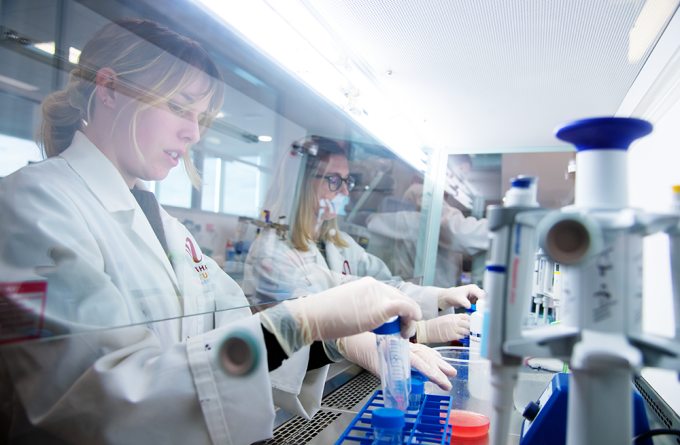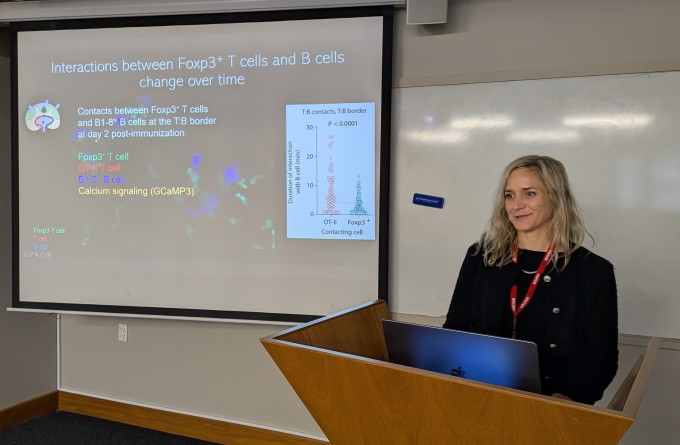13 December 2023
Conditioning the lungs with interferon-gamma, a natural immune system protein (cytokine) best known for fighting bacterial infections, appears to be a strong antiviral for SARS-CoV-2, according to National Institutes of Health scientists and colleagues.

An 'in situ hybridisation' image showing infected cells (pink) infected with replicating viral particles. Image credit Chad Clancy.
This article was originally published by the National Institute of Allergy and Infectious Disease and is republished with permission.
The study, published in Nature Communications, shows in two different mouse models that when a bacterial infection triggers the release of interferon-gamma in the lungs, those animals subsequently are protected from infection by SARS-CoV-2, the virus that causes COVID-19. The investigators further report that using recombinant interferon-gamma in the nose of study mice at the time of viral exposure substantially reduces SARS-CoV-2 infection and COVID disease.
The lead project scientists suggest testing interferon-gamma further, alone and in combination with other treatments, to limit early SARS-CoV-2 infection in people. They also hypothesise that people with prior bacterial infections that naturally release interferon-gamma in their lungs may be less susceptible to COVID-19.

Dr Kerry Hilligan
NIH’s National Institute of Allergy and Infectious Diseases (NIAID) led the project with collaborators at Malaghan Institute of Medical Research in New Zealand.
Previously, the research team had observed that a vaccine for tuberculosis, known as BCG, given intravenously to establish a mild lung infection subsequently provided strong protection against SARS-CoV-2 challenge. The new study reveals that interferon-gamma, released by the immune system in response to BCG vaccine, is required for the observed SARS-CoV-2 antiviral immunity. The investigators also examined the mechanism by which interferon-gamma protects against SARS COV-2 and presented evidence that the cytokine targets lung epithelial cells, a major site of early viral replication, thus limiting its spread.
When the project began, the research team did not expect interferon-gamma to be the necessary component for SARS-CoV-2 protection. Traditionally, other forms of interferon – alpha, beta and lambda – are known to fight viruses, but not gamma. Their findings thus uncover a newly appreciated anti-viral function for this cytokine.
"IFN-gamma is currently used in the clinic for a variety of different things but rarely for viral infections and it is administered under the skin," says Malaghan Dr Kerry Hilligan, who is a Team Leader in the Ronchese Laboratory and led this joint research. "Our study suggests that IFN-gamma could be used as a prophylactic option for limiting viral infections in highly susceptible populations, particularly if it is formulated as a nasal spray or similar.
"My current research programme at the Malaghan, led by PhD student Rebecca Palmer, is further exploring the idea of 'infection interference' to understand how the lung adapts to protect itself from concurrent or sequential infections."
Related articles

How our immune system tackles fungal foes
23 October 2025

New funding supports cutting-edge research into immune cell metabolism
13 October 2025

The Detail: The viral drift of misinformation
29 September 2025

Cancer, measles and allergic disease research funded in latest HRC grants round
19 August 2025

Dr Lisa Connor: Finding new ways to target old viruses
24 July 2025

Malaghan visiting researcher: Dr Johanne Jacobsen
22 July 2025
